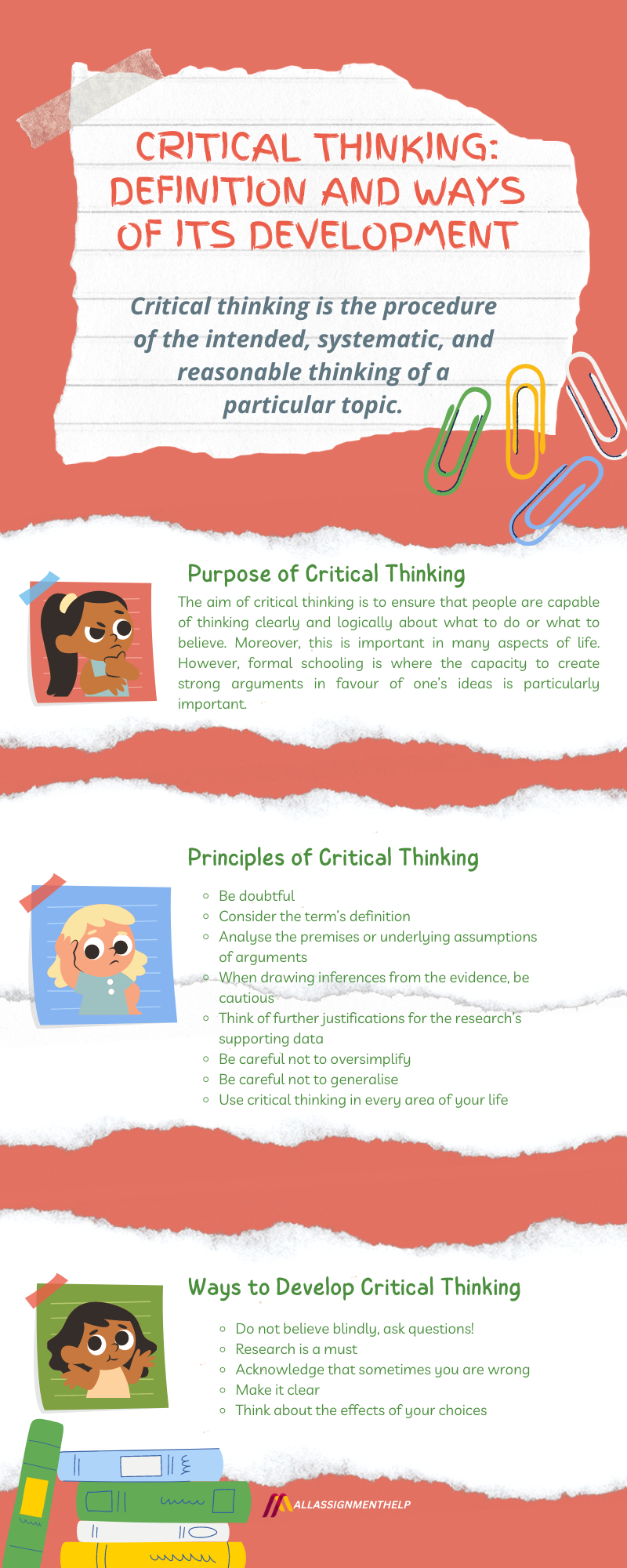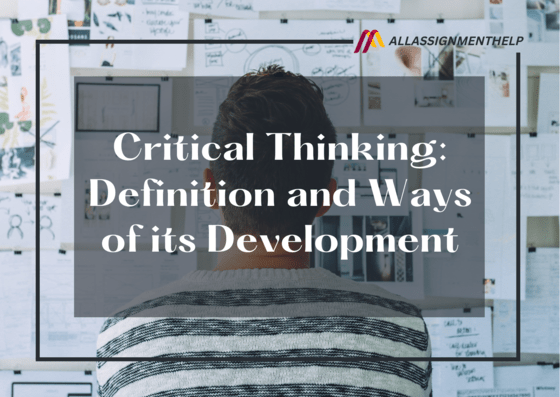Table of Contents
According to educationists, there are many definitions of critical thinking. Moreover, one such definition says that critical thinking is the procedure of the intended, systematic, and reasonable thinking of a particular topic. Furthermore, every student should have it because it is useful for writing assignments. Also, students can use it to their advantage in the working world.
Additionally, any subject, problem, or piece of information can be critically analyzed. Later, it applies these theoretical concepts and imbues them with them. Moreover, critical thinking improves thought quality, which is an advantage. Furthermore, it embodies several intellectual ideals, including precision, consistency, depth, breadth, and fairness. Besides, critical thinking requires a thorough process, which includes carefully conceiving, analyzing numerous elements, synthesizing, and, most importantly, evaluating the knowledge that has been acquired. Now, let us understand critical thinking in detail with the help of this blog All Assignment Help. Give it a quick read.
Purpose of Critical Thinking
We can say that being authentic is the main objective of critical thinking. Moreover, to guarantee that you are doing everything necessary to make the greatest choice, use critical thinking to determine your values and standards of judgment. Then, carefully analyze all the significant decisions in your life. Furthermore, according to experts some of the major purposes of critical thinking are given below.
- The aim of critical thinking is to ensure that people are capable of thinking clearly and logically about what to do or what to believe. Moreover, this is important in many aspects of life. However, formal schooling is where the capacity to create strong arguments in favour of one’s ideas is particularly important.
- For instance, when writing an essay, one must offer a strong thesis and evidence to back it. Moreover, it is not sufficient to simply list assertions or preconceptions; one must always be able to offer pertinent evidence to back up their claims. However, in case you lack such skills you can delegate your academic work with assignment writing help Furthermore, the experts here would help you with A1 quality work along with sufficient time in which you can work on your thinking skills.
- Additionally, critical thinking is crucial because it makes it possible to see how ideas are connected logically. Moreover, only by doing this can a cohesive argument be constructed. Furthermore, it is an essential component of any academic work, be it a high school essay or a Ph.D. thesis.
- Critical thinking enables us to identify weak arguments, which are frequently presented, especially online, outside of academic environments. Also, a quick check of a news website’s comments section is sufficient proof that most people struggle to put together even the feeblest of arguments.
Principles of Critical Thinking
Do not confuse ignorance with perspective. And collect comprehensive information. Moreover, one of the most crucial and most violated principles for critical thinking is thoroughness, or gathering all pertinent information about a subject under investigation. Clearly, thinking requires data; poor decisions typically come from ignorance of the facts. Now, mentioned below are the major principles of critical thinking. Read them carefully.
Be doubtful
It is important to be able to think critically. Because nothing is to be trusted in the absence of proof. Moreover, you should not believe everything that other people say.
Consider the term’s definition
When one definition is offered, some statements are discovered to be true, but not when a different one is offered. However, maintaining the phrase’s precise definition is crucial. Hence, we can say that developing critical thinking is a necessity. So, if you need time to work on your skills to hone them, in the meantime you can pay someone to do assignments and delegate your academic work with them. Because there is nothing better than a free mind to start anew.
Analyze the premises or underlying assumptions of arguments
This calls for a reconsideration of the underlying presuppositions of the argument. Moreover, consider this claim as an example. Furthermore, animal studies cannot teach us anything about humans. This claim implies that we are erroneously assuming that people are not regarded as animals. And humans are social creatures.
When drawing inferences from the evidence, be cautious
One must use caution before making any inferences based on scant information. Although there may have been other causes of the collision, such as braking failure, a drunk driver is almost always held responsible, for example.
Think of further justifications for the research’s supporting data
The conclusions we draw from studying a study may not always, or even frequently, be accurate. In other words, a variety of interpretations may be available depending on the situation. For instance, it has been proven that anger results from frustration. However, it is possible that this is not true always. Frustration is not the only factor that leads to aggression. Besides, there may be further factors. Research evidence should always be used, but different psychologists will interpret it differently. As a result, a researcher’s opinion should not be considered exhaustive and authoritative. Eventually, results must be interpreted in the context of potential alternatives.
Be careful not to oversimplify
Understanding how hereditary and environmental factors interact to influence human behavior is quite challenging. Moreover, we cannot consider finding a quick solution to issues. Furthermore, we cannot, for instance, simply inquire as to whether psychopathy will treat psychological problems. Hence, the question must be more precise; a straightforward yes/no answer is not acceptable. It would be more appropriate to ask what kind of psychopathy it is, who the doctor is, and what kind of problem it can cure.
Be careful not to generalize
The statement that studying non-human animals cannot teach us about humans is not entirely true. Therefore, generalizations like this are not entirely accurate.
Use critical thinking in every area of your life
It is crucial to have an open mind and a skeptical outlook. Therefore, never take something at face value; always demand evidence. Accepting political party marketers, gurus, and godmen without examination is a lack of critical thinking ability. Also, do not forget to use assignment help for students to meet all your academic issues.
Now, let us move forward and read about the ways to develop our critical thinking ability.

Also read: Easy Tips to Keep Your Brain Healthy and Sharp
Ways to Develop Critical Thinking
Every day, we make choices that have an impact on our lives. Moreover, it cannot be overstated how important and valuable making wise decisions is, whether in a personal or professional setting. Furthermore, critical thinking assists us in identifying any flaws in our decision-making process so that we can correct them and proceed to make better decisions in the future. Simply said, you need to be able to make decisions swiftly and critically no matter what you are doing. And to do this, you must possess decision-making skills. However, if you are still unsure of your ability to engage in critical thought or are wondering how to do so, take into account the following steps.
Do not believe blindly, ask questions!
The first thing you need to do to get better at critical thinking is that you give a thought to anything you hear, read, or decide to do and not believe anything blindly. For example, to answer an assignment question in a better way. You should try to find out, what the question is about. What could be the best answer? Are there any counter-arguments to the answer you are going to give in the assignment? However, using the best assignment writing service in such circumstances is a wise decision.
Research is a must
After asking yourself many questions, you should spend time researching the assignment. Moreover, you should use your library books, the internet and newspapers or magazines, etc. With that, you can also discuss your assignment topic with an expert or your professor. Hence, in this way, you will be able to gain quality information and could write a compelling answer to the question.
In the real world, critical thinking occasionally requires letting go of your convictions in order to confront problems. Reluctance to study, learn, or absorb new ideas will only hold you back and unquestionably impair your capacity for critical thought. Moreover, you will learn that if you put in the work and focus on learning, over time you’ll change and adapt to meet new problems and hone your critical thinking skills.
Acknowledge that sometimes you are wrong
It can be more difficult than it appears. Moreover, no matter who we are or what we do, we all make mistakes. The fact that most individuals want to disregard this reality, however, prevents us from exercising critical thinking. Furthermore, you should quit for your own benefit if you realize what you are doing is wrong but continue to do it nonetheless because you already believe you can do no wrong. In addition to this, always double-check your work, keep an open mind, and see mistakes as a chance to grow.
Make it clear
Being able to see the big picture is great, but being able to break things down into smaller, more manageable pieces is even better. Therefore, smaller pieces are easier to deal with and process intellectually. Besides, it is easier to work on many small tasks at once rather than the larger, potentially daunting, picture.
Also read: Positive Thinkers Spreading Optimism
Think about the effects of your choices
Every decision we make has an impact on the individual involved as well as occasionally other parties. Moreover, you must consider the potential outcomes of each of your alternatives. Furthermore, select the one that would benefit you the most while having the fewest negative effects on other people. Besides, making a list of benefits and drawbacks is a useful technique to do. Also, you can make a decision that is much more well-informed if you ask yourself to consider both all potential positive outcomes and all potential bad consequences.
Conclusion
In conclusion, having the ability to think critically will be useful to you both inside and outside of the classroom. Moreover, we hope reading this post has encouraged you to reflect more deeply on your own life. Furthermore, remind yourself that learning critical thinking is a lifelong endeavor and that there is always more to learn.
Frequently Asked Questions
| Question: 1 How might one best hone their critical thinking abilities? Answer: 1 You can develop your critical thinking capabilities in the following ways: • Clearly define your goals • Face your prejudices • Think about the effects of your choices • Make research • Recognize that you do not always have it right • Take it apart • Do not make things too complicated |
| Question: 2 What are the five methods of critical thinking? Answer: 2 There are five aspects of critical thinking. Moreover, these are open-mindedness, respecting logic and facts, having the mental flexibility to consider many views and points of view, not being confined to one place, skepticism, and precision and clarity. |
